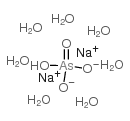Indian spice curcumin may be an effective strategy to combat the genotoxicity of arsenic in Swiss albino mice.
Jaydip Biswas, Soumi Roy, Sutapa Mukherjee, Dona Sinha, Madhumita Roy
文献索引:Asian Pac. J. Cancer Prev. 11(1) , 239-47, (2010)
全文:HTML全文
摘要
Inorganic arsenic (As) is considered as a human carcinogen because it is associated with cancers of skin, lung, liver and bladder in exposed population. Consumption of As contaminated ground water for long term causes oxidative stress. Generation of reactive oxygen species (ROS), beyond the body's endogenous antioxidant balance results severe imbalance of the cellular antioxidant defense mechanism. The present study was conducted to investigate the antioxidative effect of curcumin against sodium arsenite (As III) induced oxidative damage in Swiss albino mice. Bio-monitoring with comet assay and micronucleus assay revealed that the increase in genotoxicity caused by As III was counteracted when mice were orally administered with 5, 10 and 15 mg curcumin kg-1 bw (body weight) daily. ROS generation, lipid peroxidation and protein carbonyl content, which were elevated by As III, were reduced when treated with curcumin. Curcumin also exhibited protective action against the As III induced depletion of antioxidants like catalase (CAT), superoxide dismutase (SOD), glutathione peroxidase (GPx), glutathione reductase (GR), glutathione S-transferase (GST) and glutathione (GSH) in mice liver tissue. Thus the present work provides a direct evidence for the involvement of curcumin in reducing As III induced oxidative stress in Swiss albino mice by virtue of its antioxidant potential and trapping of free radicals.
相关化合物
| 结构式 | 名称/CAS号 | 分子式 | 全部文献 |
|---|---|---|---|
 |
砷酸氢二钠
CAS:10048-95-0 |
AsH15Na2O11 |
|
An in vitro method for estimation of arsenic relative bioava...
2013-01-01 [J. Toxicol. Environ. Health A 76(7) , 458-78, (2013)] |
|
Measurement of arsenic relative bioavailability in swine.
2013-01-01 [J. Toxicol. Environ. Health A 76(7) , 449-57, (2013)] |
|
Arsenic alters behavioral parameters and brain ectonucleotid...
2012-05-01 [Comp. Biochem. Physiol. C. Toxicol. Pharmacol. 155(4) , 566-72, (2012)] |
|
Urinary arsenic speciation profiles in mice subchronically e...
2011-09-01 [Kaohsiung J. Med. Sci. 27(9) , 417-23, (2011)] |
|
Indigenous soil bacteria with the combined potential for hyd...
2012-03-01 [Environ. Sci. Pollut. Res. Int. 19(3) , 812-20, (2012)] |